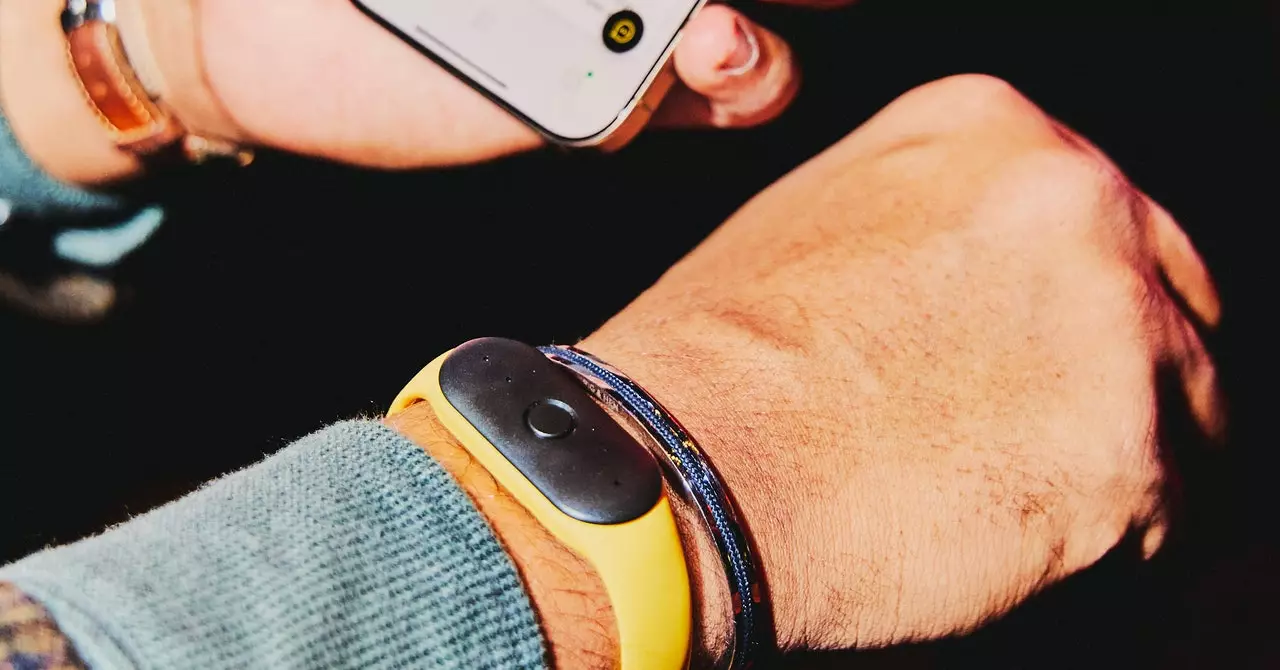In recent years, the tech industry has witnessed an unparalleled surge in the development and proliferation of wearable devices. From fitness trackers to smartwatches, these gadgets have evolved dramatically, but a new class of wearables is challenging our perceptions of privacy and interaction. At the forefront of this revolution are devices like the Bee AI Pioneer and the Omi, which leverage artificial intelligence to transform how we interact with our environment and ourselves.
During a recent technology conference, I had the opportunity to wear a vibrant yellow bracelet—seemingly just another fitness tracker—yet it was far more profound. Known as the Pioneer from Bee AI, this ingenious device did not merely monitor my physical activity; it captured and processed conversations in my vicinity. Unlike traditional recording devices, which require explicit activation and manual operation, Bee AI’s design reflects an ambitious vision of ambient computing. Rather than recording audio indiscriminately, it intelligently extracts relevant information from my dialogues and generates personalized to-do lists and summaries, akin to having a personal assistant by my side.
Furthermore, the launch of Omi—a similar device with innovative features—highlights the increasing integration of AI into our daily routines. Omi’s wearable, designed to rest against the forehead, employs electroencephalography technology, enabling users to communicate with it through focused thought. This leap into consciousness-driven interaction represents a dramatic shift in user-device engagement. Instead of simply responding to voice commands, wearables are now capable of initiating interactions based on mental cues, embodying an era where our cognitive processes directly influence technological responses.
Historically, voice-activated devices such as Amazon’s Alexa or Google Assistant relied on deliberate user engagement—requiring a wake word or physical interaction to begin listening. The latest wearables represent a significant evolution from this model; they operate passively, continuously absorbing their surroundings without necessitating active participation. Devices like the Bee AI and Omi exemplify this shift, demonstrating a willingness to embrace a world where technology is always ‘on’, processing information in real time.
However, this constant monitoring brings a host of ethical dilemmas. As these devices integrate seamlessly into our lives, it’s crucial to question the implications of having personal conversations recorded and analyzed by AI systems. Privacy concerns loom large; how secure is the data captured by these wearables, and who has access to it? Moreover, with ongoing advancements in natural language processing and machine learning, users may unwittingly surrender intricate details about their lives to powerful algorithms.
The Intersection of Affordability and Innovation
Interestingly, the affordability of these devices presents a paradox. With the Bee AI’s Pioneer priced at $50 and Omi’s device available for $89, they are economically accessible compared to other high-tech equipment. However, the real value lies not merely in their physical attributes, but in the advanced software driving their capabilities. These wearables hinge on subscription-based models that provide access to powerful language models equipped to analyze conversations. The initial cost may appear reasonable, but users must also consider the ongoing financial commitment required to obtain the insights promised by these technologies.
The teams behind these innovations—such as Bee AI’s founders Maria de Lourdes Zollo and Ethan Sutin—bring deep industry experience from notable tech giants. Their backgrounds highlight a blend of vision and technical expertise necessary for creating solutions that resonate with contemporary consumer needs. As individuals increasingly seek ways to manage the complexities of their busy lives, the demand for wearables capable of seamlessly integrating into our daily routines continues to rise.
Grappling with the Future: Prospects and Concerns
As we embrace these emerging technologies, we must remain vigilant about the potential impacts on our lives. While AI-infused wearables offer enticing prospects for enhancing productivity, improving organization, and simplifying decision-making, we must also scrutinize the ethical ramifications. Will users fully understand the extent to which their interactions are monitored? What governance frameworks are in place to protect sensitive data?
The advent of AI-powered wearables is set to redefine our relationship with technology, privacy, and even ourselves. As we navigate this new frontier, it is imperative that we balance innovation with conscientious consideration of the privacy and ethical implications at stake. The future may appear promising, but it also demands a critical dialogue about how we engage with these intelligent devices. The path forward is not merely about embracing the latest gadgets; it involves fostering a culture of responsibility around the technologies that will inevitably become part of the fabric of our daily lives.


Leave a Reply